As a homeowner, you may want to pressure wash your AC unit but wonder if it is okay to do so. Fortunately, we have researched this question, and here is what we found.
An air conditioner should never be pressure washed. There are other ways to clean your air conditioner. Using a pressure washer is not an option. It may damage your AC coil, leading to system failure.
The AC unit needs to be cleaned often so it can last longer. Keep reading to get detailed information on how to wash your AC unit without damaging it.
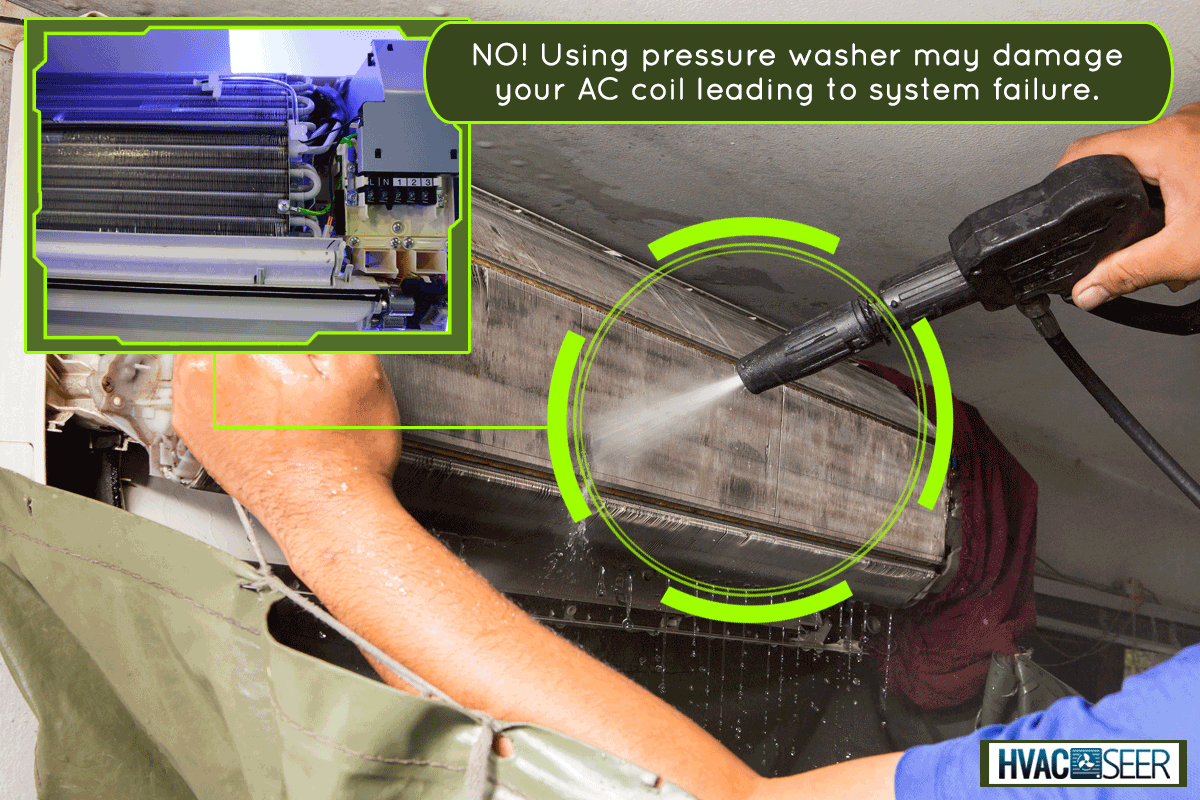
Can I Pressure Wash My AC Unit?
An air conditioner is among the most expensive appliances in a home. Therefore, owners may want to protect their investment by cleaning.
You can avoid expensive repair costs by routine maintenance on your air conditioner. However, cleaning with the wrong equipment can damage your system.
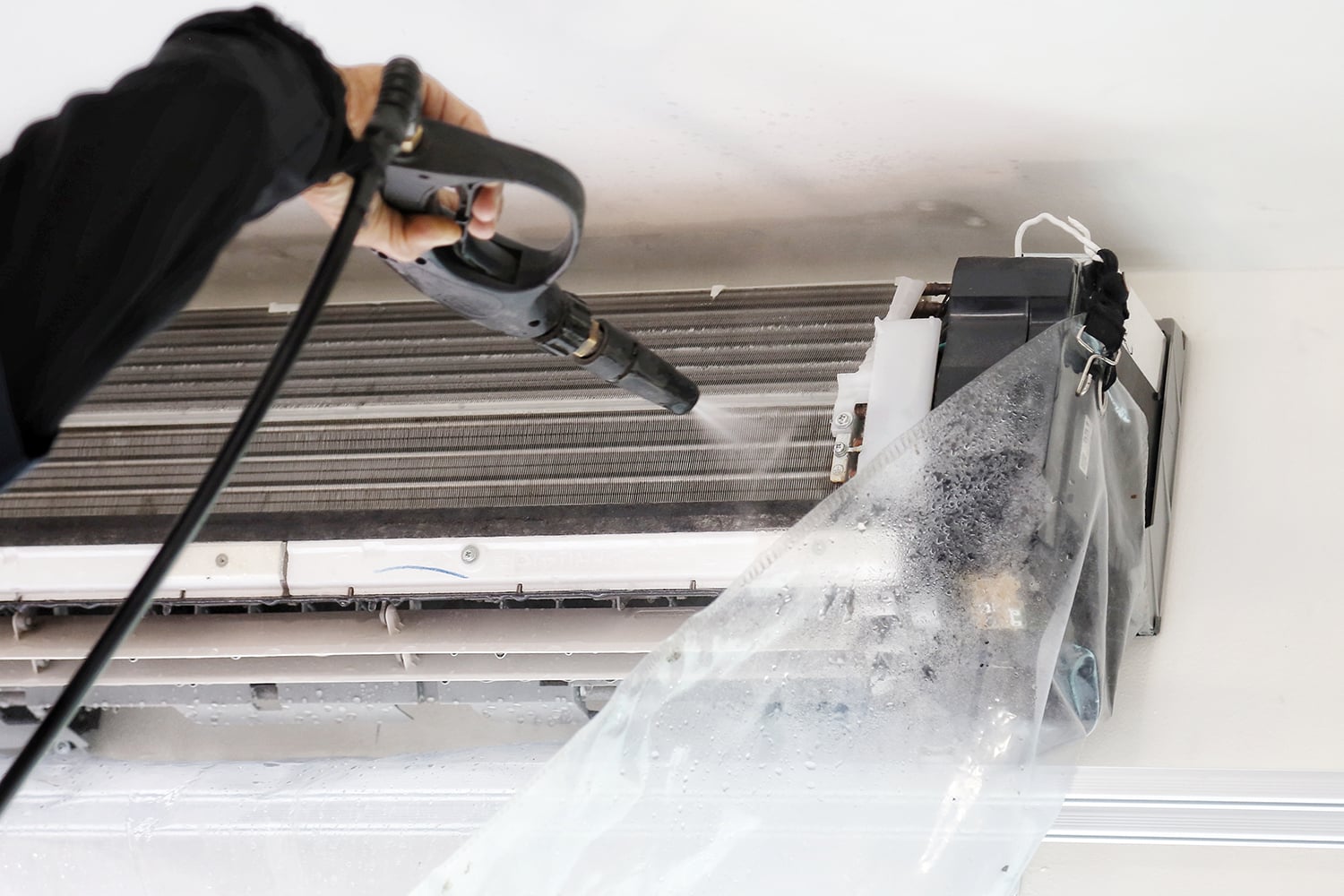
A system full of dirt won't work well and is more likely to break down. To avoid damage and keep from wasting energy, many AC owners try to clean the coils.
A pressure washer may seem like the best option because of how well dust and mildew are removed by its high force. Unfortunately, it is not suitable for your unit's coils.
A pressure washer will make things worse by damaging the fins. These metal pieces may bend when subjected to high pressure. The tubes may also get damaged as a result.
The force of a power washer is too much for AC coils. Since coil repairs are expensive, it is not advisable to pressure wash your AC unit.
How Do You Clean The Outside AC Unit?
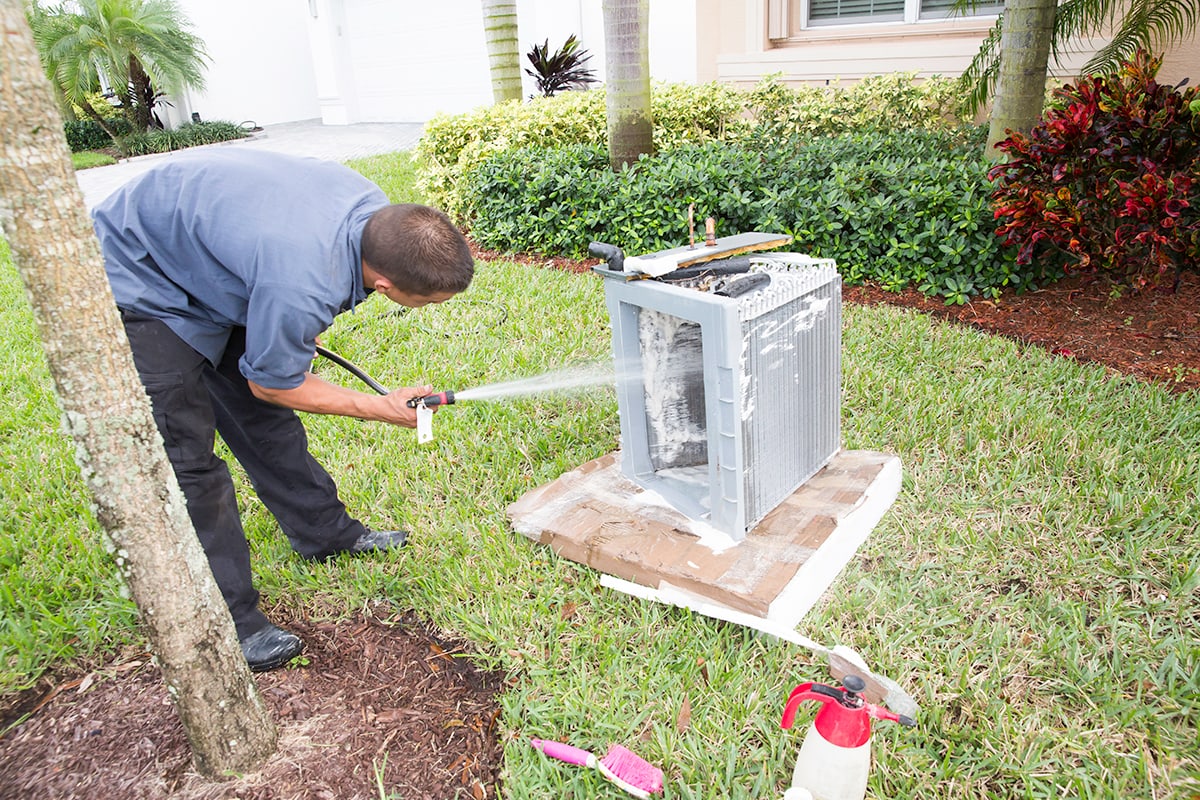
Dirt and debris accumulate around your outdoor air conditioner's cooling fins while it is outside. This makes cleaning the outside air conditioning unit crucial. Here are step-by-step procedures on how to go about this.
Switch Off Your AC Unit
Put safety first by turning off the appliance before cleaning it. Locate the power shut-off box close to the outside unit and disconnect it. Do the same for the breaker box inside.
Clear The Surroundings Of Your Unit
Ensure the area around the outside AC unit is dirt-free—clear grasses and dirt accumulated around and on the unit.
A wet-dry vacuum with a soft-bristled attachment should take care of any debris you cannot remove yourself.
Clean and Straighten The Fins
To eliminate dirt and debris, hose down the fins from the inside out. Gently straighten the fins if they are bent.
Clean The Air Filter
If your air filter is still good, a powerful spray from the garden hose will quickly clean it. If it is already damaged, replace it as soon as possible.
Click here to see this AC air filter on Amazon.
Clean The Condenser Coil
The accumulation of dirt, dust, and debris on the AC condenser coils can affect its cooling performance. The coil should be vacuumed, and any leftover debris should be washed away using a garden hose.
Avoid damaging or bending the coils and fins as you do this. A moist rag should be used to clean the fan blades as well. You can get a professional to do the cleaning if you don't want to do it yourself.
How Do I Know My AC Needs To Be Cleaned?
For your system to function efficiently throughout the warmest times of the year, cleaning is essential. Keep an eye out for these signs that show your system needs to be cleaned:
Increase In Electricity Bill
According to estimates, dirty evaporator and condenser coils can cause your air conditioner to use more energy, over 30% more.
If you monitor your electricity bills and see an unusual rise, dirty AC may be responsible.
The efficiency of your AC should be restored once the coils have been cleaned, and so should the amount of your electricity bill.
AC Blowing Warm
If your coils are dirty, heat can get trapped. Consider this a traffic jam in which the heat within your home cannot go through the system and be released outside.
Even if the air conditioner is turned on, the air will be warm or slightly cooled.
AC Works Harder
When the AC coils get dirty, the unit must work longer and harder to cool the interior space. This can cause extra wear and tear on your unit, reducing its life span.
Can I Spray Water On My AC While It's Running?
You can spray water on your AC unit. Spraying water on it while it is running is advisable, especially for cleaning. You can do this with your yard hose.
To effectively clean your device, simply run your hose over it from top to bottom while it is set to a hard stream. For better performance, you may also need to spray other parts.
However, you should pay attention to the components of your air conditioner that need to stay dry. After cleaning it, you do not want to have a damaged system.
How Does Spraying My Outside AC Unit With Water Help?
You might be reluctant to spray water on your air conditioner when it's time to clean it, considering that water and electrical appliances shouldn't come in contact. But for an AC, spraying water helps.
If your outdoor air conditioner requires cleaning, you can spray water on it without worrying about anything wrong happening.
You can make your air conditioner run more effectively by spraying water on the condenser. For your condenser to continue working well, it must be sprayed frequently.
How Often Should You Clean Your Outdoor AC Unit?
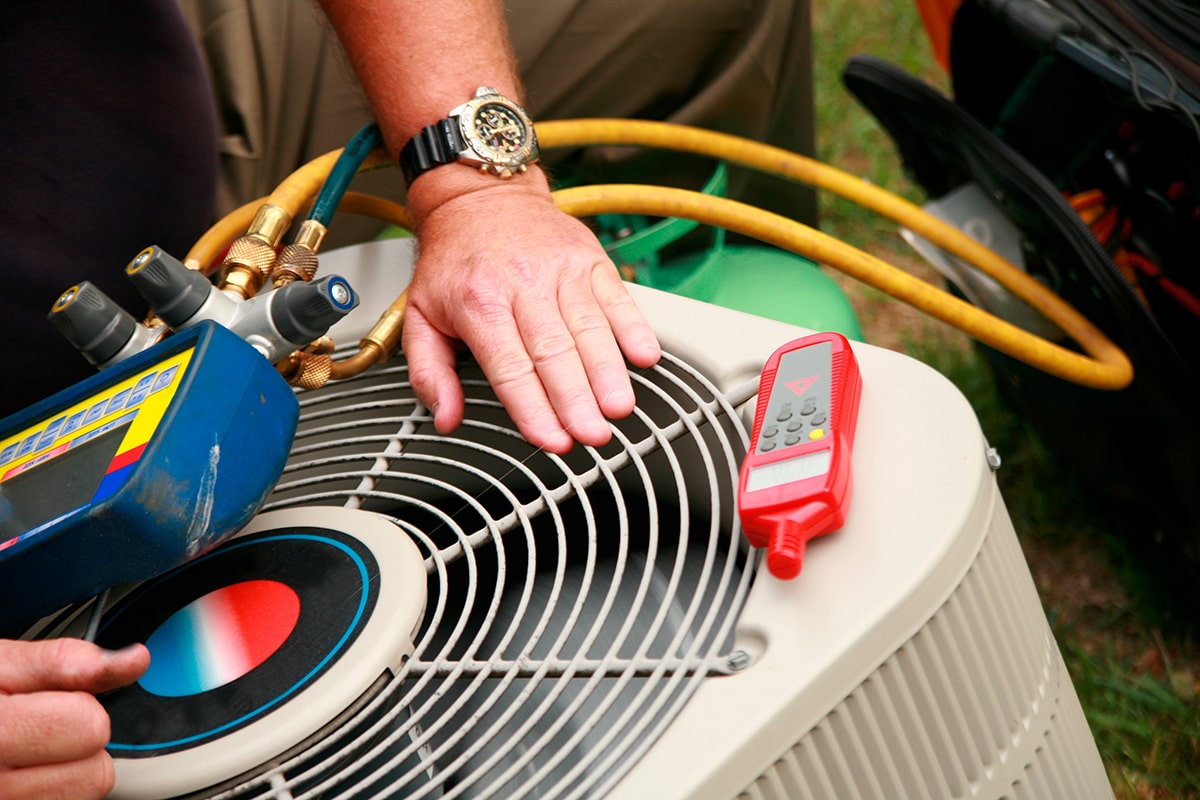
Twice a year is enough for cleaning an outdoor AC unit. Clean the unit during the spring, before summer, and again in the fall, before winter.
Dust and dirt can accumulate on air conditioners, especially on the air filter and coils.
Allowing dust to accumulate may affect your system's efficiency in emitting cool air. Remember that dirty air can cause sickness.
How Much Does It Cost To Have AC Coils Cleaned?
Cleaning AC coils will cost anywhere from $100 to $400. This should be done often for system efficiency.
The exterior of your home's condenser coil can be cleaned for $75 to $200 as part of your yearly AC tune-up.
Duct cleaning costs anywhere from $250 to $500, covering the evaporator coil in the air handler. This is for a separate service.
The work of coils is to absorb heat into the refrigerant that moves through it, taking heat from one place to another. The evaporator coil in your home's air handler absorbs heat for air conditioning.
Then, the heat is transferred to the condenser coil. The heat is released in this coil. For heat pumps, the opposite is the case. The component's work can be affected when the coils are left dirty.
Is Bleach Or Vinegar Better For AC Drain Line?
Given that bleach can corrode copper tubing in your AC's drain line, it is better to use vinegar instead.
Vinegar only leaves an odor after spilling, whereas bleach can destroy your carpet or clothing.
You can prevent the growth of mildew, bacteria, and algae in your air conditioner by pouring one capful of vinegar down the drain. Vinegar is a safe yet efficient cleaning solution in this case.
Should You Vacuum Your Air Conditioner?
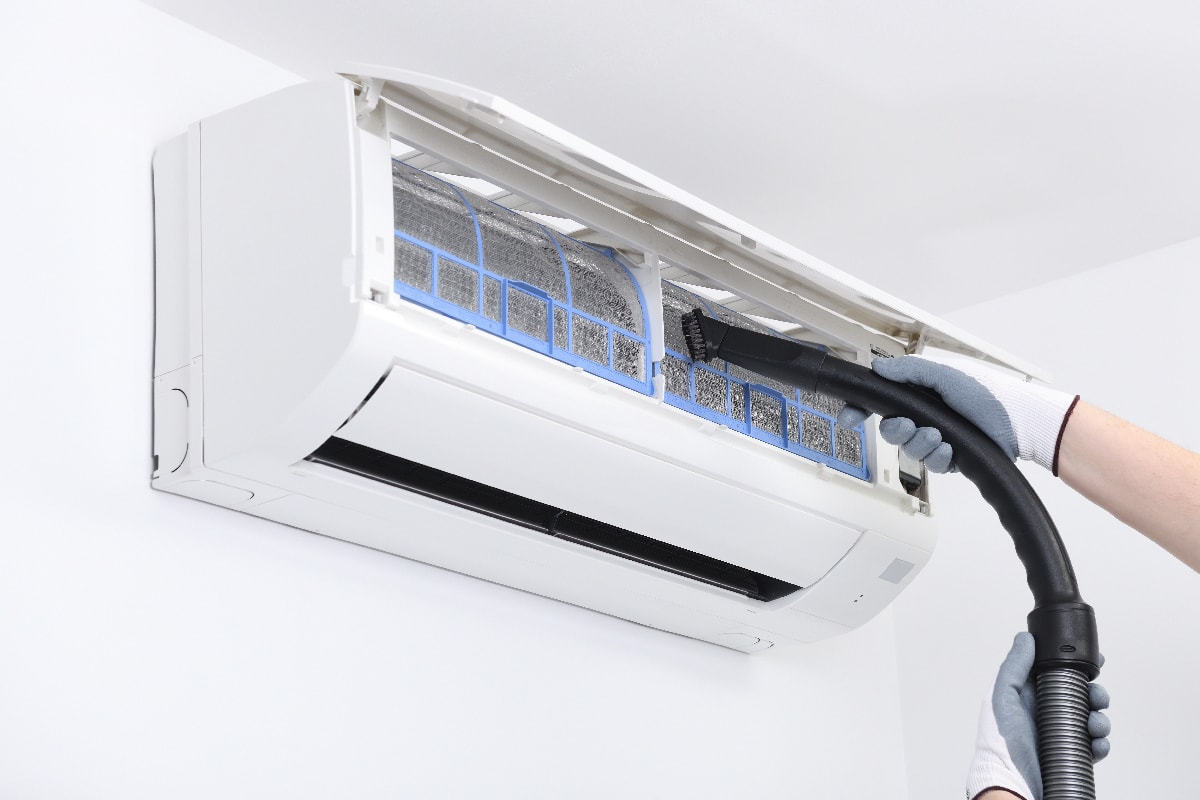
A vacuum can perform the basic cleaning of your air conditioner, including cleaning the access panels' filters and any other dust-gathering filters or coverings.
To maintain the airflow through the air conditioner, you should do this every three to six months.
After removing the access panels, you may use the vacuum to remove general debris from the surface of the air conditioner's coils and other interior components.
To Wrap Up
You don't want to damage your system while cleaning, so avoid pressure washing your air conditioner. If you find cleaning your unit difficult, you can contact a professional for help.
If you enjoyed reading this post, here are similar articles you may like:
Can You Wash And Reuse HEPA Filters?

